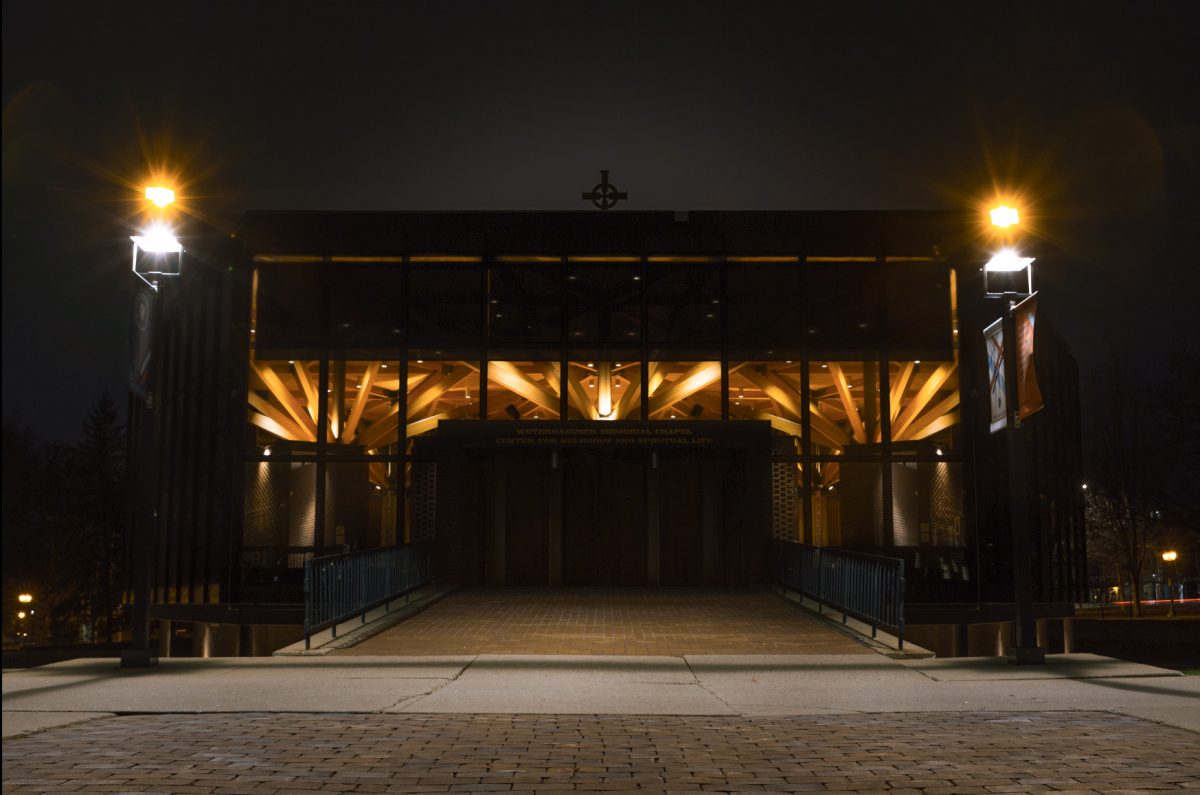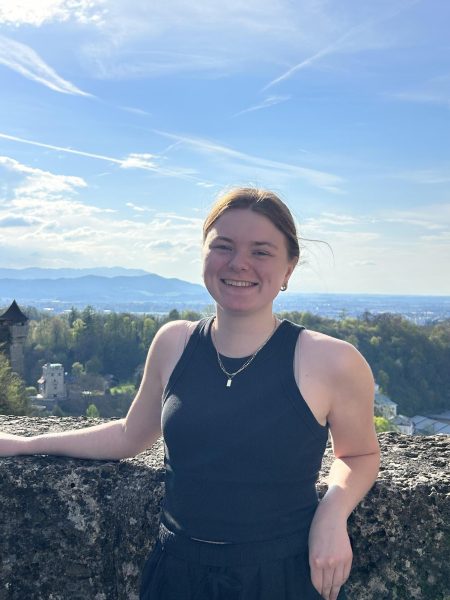As the world, and Macalester, continues to witness and process the ongoing Israel and Palestine conflict, competing narratives have emerged, creating harsh lines between people aligned with either side. To help the Macalester community grapple with this topic, Mac held “The Contrapuntal Imagination,” a talk concerning Arab and Jewish identities and their interconnectedness in a historical and literary context.
“The Contrapuntal Imagination: Alternative Palestinian and Jewish Narratives About the Present and Past,” held on Feb. 13 in Weyerhaeuser Chapel, came out of a partnership with the Kofi Annan Institute for Global Citizenship (IGC), Jan Serie Center for Scholarship and Teaching, Center for Religious and Spiritual Life (CRSL) and the Provost’s Office.
The event’s name comes from the famed literary critic Edward Said — whose works are often assigned in classes at Macalester — and his book “Culture and Imperialism.”
Khaldoun Samman, a professor in the sociology department and the event’s moderator, explained how Said’s writing on knowledge, and more specifically the institutions that hold knowledge, has immense power. According to Samman, institutions can create narratives that support their causes, leading to one-sided histories and coverage of issues such as what is happening in the Middle East.
Samman said that political states, such as Israel, have the power to create narratives that promote this idea of “us” and “them”. Samman discussed how the idea that there are two sides– pro-Israeli and pro-Palestinian– brings with it structural violence.
“What is happening now in Rafah is 1.9 million Palestinians are being forced to a very small sector, while the rest of Gaza is being destroyed,” Samman said. “There is a narrative structure of the media that doesn’t allow us to see that.”
The panelists featured were Shir Alon, assistant professor of Middle Eastern literature and Arabic and Hebrew culture at the University of Minnesota; Joe Farag, associate professor of modern Arab studies at the University of Minnesota and Noam Sienna, a postdoctoral research fellow at the University of Toronto.
Samman’s first question to the panelists surrounded the reasons why discussing literature, something conceptual, matters in this time of innate, tangible violence.
In response, each panelist read an excerpt from a poem of their choosing to highlight their viewpoint.
Alon started with how literature is a space to step away from the present and contemplate the issues at large. She offered a poem by an Israeli poet and choreographer, Leslie Leskly, entitled “Dance Eleven” and discussed her personal experience.
“For me personally, one of the hardest things in the past month, as somebody who left Israel many years ago is, alongside watching the unfolding genocidal violence in Gaza, witnessing the mechanisms of denial and distortion that are operating in Israel,” Alon said.
Farag shared an excerpt from “The Red Indians’ Penultimate Speech to the White Man” by Palestinian poet Mahmoud Darwish and explained why literature feels more connected and relevant to the problems facing the world today than other social sciences.
Sienna discussed his work with Judeo-Arabic, a group of Arabic dialects spoken by Jews and written phonetically in Hebrew characters, which is going extinct. His speech and the poem, “My Arabic is Mute” by Almog Behar, highlighted the forgotten stories of these cross-religious communities and people.
“For me as a historian, that means not just [finding] the voices that happened to be absent in a particular text, but rather finding the voices that have been forced into silence or scared into hiding,” Sienna said.
Samman then posed the question: when did this Arab-Israeli conflict begin? Farag discussed the Nakba, which is widely recognized as the mass displacement and dispossession of Palestinians during the 1948 Arab-Israeli war. Farag argued that the Nakba did not start in 1948 but was a longer systematic process.
“The Nakba began at the end of the 19th century and continues,” Farag said. “Settler colonialism is a structure … it’s an amplification of a process that has been ongoing.”
Samman then brought the conversation into the present at Macalester, with comments on the archeological dig that sends students to Israel. He said it is right that students are raising questions; how only doing digs on Israeli sites contributes to erasing Palestinians’ narratives, and explaining the possibility of Macalester including Palestinian digs as well as Israeli digs.
“Those are the things that make [Palestinian history] invisible … [Macalester] could be an institution on the forefront,” Samman said. “It’s not to leave out other archaeological digs, just include other archaeological digs.”
Next, the panel answered questions from the audience, starting with the modern-day relationship between the United States and Israel.
Sienna discussed a purposefully forgotten history where in the mid-20th century, leaders of the American Jewish community were against occupation and demanded a ceasefire in the Six Day War.
“What makes this dynamic and so disruptive is that it is a kind of historical amnesia that erases the complexities of our own living memory,” Sienna said.
An anonymous question read: “Since 1948, Palestinians have enjoyed some of the greatest rates of [population] growth in the world. Why label this as an ethnic cleansing?”
“Ethnic cleansing does not necessarily mean killing every member of the community,” Alon said. “It means displacement. It means exile. It means denying people rights where they live. It means the end of the group’s opportunity to grow and flourish.”
“It is very explicitly part of the Israeli government’s policy to ensure a Jewish majority in the territory of Palestine,” Alon said.
The last question asked if the harsh dichotomy of pro-Israel and pro-Palestine is too polarizing – their answer was simply yes.
With the event, Samman had hoped that students would be able to go beyond the narrative crafted by governments and media and bring this ‘contrapuntal imagination’ of the intersections of these faiths, traditions and institutions into their lives and work.
“We are trying to build a community of professionals who go against that grain and could offer other narratives and not just be the puppets of those who have power,” Samman said.












David G • Feb 18, 2024 at 6:13 pm
“We are trying to build a community of professionals who go against that grain and could offer other narratives and not just be the puppets of those who have power,” Samman said.
Wow.
Is there a championship for irony? This is really up there. I hope the members of the academy are paying attention. This is really worthy of their consideration. This article could not have been finished with a better quote.